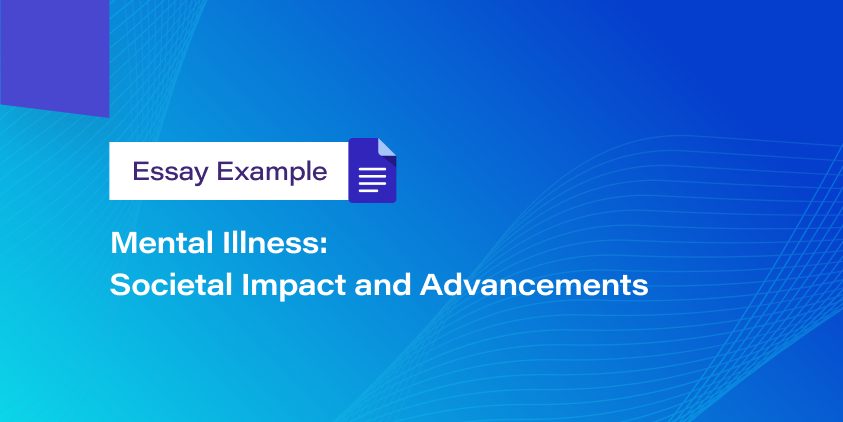Mental Illness: Societal Impact and Advancements

A human being’s existence is a parity of opposite concepts. There is, for example, the most crucial opposition: life and death. Another thing is health and illness. A disease of the body is a matter of close medical attention, while a disease of the mind is a condition that makes society suffer along with an individual. The paper aims to identify and describe mental illness and the steps taken to improve the situation.
According to the World Health Organization (WHO), health is “a state of complete physical, mental and social well-being and does not consist only of the absence of disease or infirmity” (World Health Organization, 2013). The twentieth century brought to the world’s view a real problem that concerns the increasing number of mentally ill people. Richard J. McNelly writes: “Nearly 50 percent of Americans have been mentally ill at some point in their life” (McNelly, 2011, p. 1). It is an issue that needs close analysis.
Health medicine has developed in the past two thousand years. Different beliefs have existed in nearly every culture and tended to provide explanations for mental illnesses. Schizophrenia, for example, was considered a doing of the devil, an attribute of witchcraft or even the will of gods. Scientific progress replaced faith healing and shamanism with diagnosis and medicine. The appearance of the Diagnostic and Statistical Manual with the list of disorders has improved the situation. It has implied that if a disorder is known, there is a treatment that follows the knowledge about a disease. Methods for studying mental illnesses have advanced. Scientists understand more about the brain, human behavior, and the influence of the environment on a human being. This information ensures them to find causes, effects and ways to make a person recover.
Mental illness, whether anthropological or social by nature, separates a person from the world. Disorders of the mind constitute a threat to an individual and society. That is why society has a global emergency that touches on human rights. People do not have access to the necessary mental health care. Poor treatment and living conditions are the reality of various psychiatric institutions. That is why it has been a priority for many health organizations to find a solution that the situation under consideration demands. As a result, the Convention on the Rights of Persons with Disabilities (2008) has included the right to live in the community, civil and political rights, social protection and other rights. The National Institute of Mental Health presented a new strategic plan in the same year. The director of the institute, Thomas R. Insel, considers one of the plan’s main goals to be a project that draws the attention of the National Institute of Health to the “4 P’s”. The “4 P’s” are: “increasing the capacity to Predict who is at risk for developing disease; developing interventions that Preempt (or interrupt) the disease process; using knowledge about individual biological, environmental, and social factors for Personalized interventions; and ensuring that clinical research involves Participation from the diversity of people and settings involved in health care” (National Institute of Mental Health, 2008, p. 3). Among the Department of Health and Human Services (HHS) efforts, a program called SAMHSA (Substance Abuse and Mental Health Service Administration) is distinguished. The program’s purpose is to support people with post-traumatic disorder. SAMHSA prioritizes eligibility for individuals in the sphere of the justice system. The program successfully encourages research for effective treatment so that people recover and reduce the impact of mental disorders on society.
The changes in legislation also have their effects. A major step forward is the UN Convention on the Rights of Persons with Disabilities. People can feel that they have actual rights to claim. The police, health professionals, lawyers, and judges take into consideration those rights in the process of communication with people who have mental disabilities. A medical person is better trained and attentive to a patient. People tend to understand those who suffer from mental illnesses more. Society has managed to become tolerable and understanding.
The paper has explored the issue of mental illnesses along with its social and political aspects. A few past years have shown progress in health and human services. The long history of mental illnesses has prioritized the matter in society. HHS creates programs to solve the human rights problem that people with mental disorders cannot always claim. This has led to changes in legislation that have a positive effect on the community. Improvements may be found in special facilities for people with mental disorders. The political and jurisdictional systems have improved attitudes toward such people. Mental illness is no longer treated as a contagious disease but a state of mind that requires special treatment. People with disorders can vote to protect their rights in court and be accepted in society. Healthy people avoid the problems of those who have some health failures. This is until a certain disorder touches the health of the mind of people who have had perfect health before or their family. Most programs’ purpose is to make humanity care about each other. Otherwise, people are no better now than they were during the Inquisition.
📎 References:
1. National Institute of Mental Health. (2008). The national institute of mental health strategic plan (NIH Publication No. 08-6368). Washington, DC: U.S. Government Printing Office.
2. McNally, R.J. (2011). What is mental illness? Harvard University Press.
3. Porter, R. (2002). Madness: A Brief History. Oxford: Oxford University Press.
4. U.S. Department of Health & Human Services. Retrieved from https://www.hhs.gov/.
5. World Health Organization. (2013). Building back better: sustainable mental health care after emergencies. WHO: Geneva.
6. World Health Organization. (2013). Mental health, human rights & legislation.
